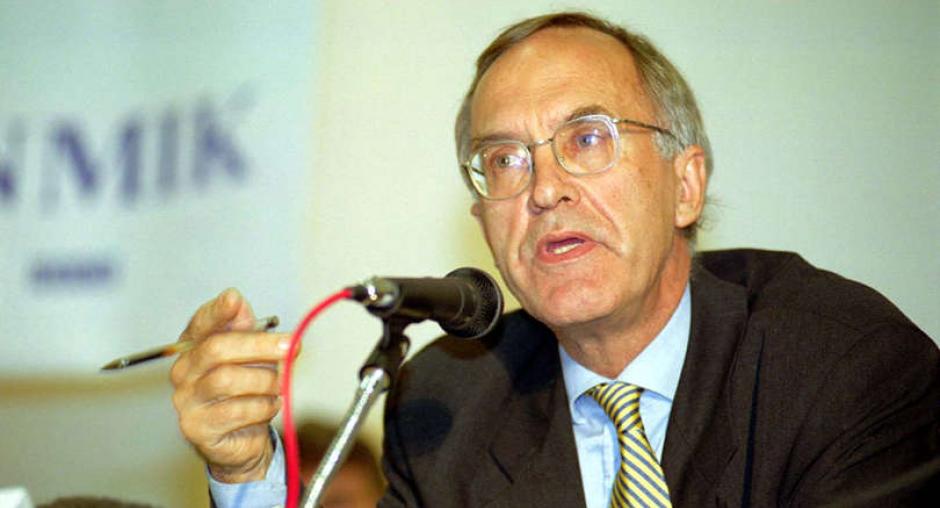Newsroom
Political Independence of Radio Television Kosovo "crucial and huge step forward"
PRISTINA 30 May 2001

Ambassador Everts, Head of the OSCE Mission in Kosovo, speaking to the media. (Lubomir Kotek/OSCE) Photo details
PRISTINA, 30 May 2001 (OSCE) - A new regulation establishing Radio Television Kosovo (RTK) as the sole public service broadcaster in the province, has been described by Daan Everts, OSCE Mission Head, as "crucial" for the people in Kosovo. He praised the Kosovo members of the IAC for supporting the regulation.
The new regulation, which was approved at yesterday's meeting of the Interim Administrative Council (IAC), confirms the political independence of RTK. "This is a huge step forward. It is crucial that people have access to reliable, non-partisan information. This regulation will ensure that Kosovo has a truly independent public service broadcaster, free from political interference and state control", Everts said.
Under the regulation, RTK will have an independent board of directors. The nine-member board will be made up of six representatives from Kosovo and three international representatives.
In order to prevent conflict of interest and safeguard RTK's independence, no one who holds elected public office, is a member of the executive body of a political party or has financial interests in the telecommunications or broadcasting industries may sit on the board.
Nominations for the local representatives will be sought through the NGO Assembly, the Association of Journalists of Kosovo, the Senate of the University of Pristina, and the Workers' Union of RTK. This means that Kosovo society will have a say in how RTK is run.
The regulation also obliges RTK to "give a voice to all communities in Kosovo". It is required to strike a balance between programmes that have wide popular appeal and programmes, which serve the needs of specific audiences. At least 15 per cent of its prime-time news coverage and 15 per cent of its programming, for example, must be in the languages of Kosovo's non-majority communities.
As a not-for-profit public service broadcasting organisation, RTK will be partly financed by a public viewing fee.
The OSCE has been supporting RTK since the arrival of the international administration in Kosovo. One of the Mission's first achievements was helping to get the station on-air by satellite in 1999. Since then, RTK's television studio has been refurbished and its radio and television programmes are once again also available in Kosovo on the reconstructed terrestrial broadcast network.
--
For more information please contact Claire Trevena, Spokesperson, OSCE Mission in Kosovo, tel: (+381-38) 500-162 ext. 260, mobile: +377 (044) 500-150; email: press@omik.org, website: www.osce.org/kosovo/
The new regulation, which was approved at yesterday's meeting of the Interim Administrative Council (IAC), confirms the political independence of RTK. "This is a huge step forward. It is crucial that people have access to reliable, non-partisan information. This regulation will ensure that Kosovo has a truly independent public service broadcaster, free from political interference and state control", Everts said.
Under the regulation, RTK will have an independent board of directors. The nine-member board will be made up of six representatives from Kosovo and three international representatives.
In order to prevent conflict of interest and safeguard RTK's independence, no one who holds elected public office, is a member of the executive body of a political party or has financial interests in the telecommunications or broadcasting industries may sit on the board.
Nominations for the local representatives will be sought through the NGO Assembly, the Association of Journalists of Kosovo, the Senate of the University of Pristina, and the Workers' Union of RTK. This means that Kosovo society will have a say in how RTK is run.
The regulation also obliges RTK to "give a voice to all communities in Kosovo". It is required to strike a balance between programmes that have wide popular appeal and programmes, which serve the needs of specific audiences. At least 15 per cent of its prime-time news coverage and 15 per cent of its programming, for example, must be in the languages of Kosovo's non-majority communities.
As a not-for-profit public service broadcasting organisation, RTK will be partly financed by a public viewing fee.
The OSCE has been supporting RTK since the arrival of the international administration in Kosovo. One of the Mission's first achievements was helping to get the station on-air by satellite in 1999. Since then, RTK's television studio has been refurbished and its radio and television programmes are once again also available in Kosovo on the reconstructed terrestrial broadcast network.
--
For more information please contact Claire Trevena, Spokesperson, OSCE Mission in Kosovo, tel: (+381-38) 500-162 ext. 260, mobile: +377 (044) 500-150; email: press@omik.org, website: www.osce.org/kosovo/
